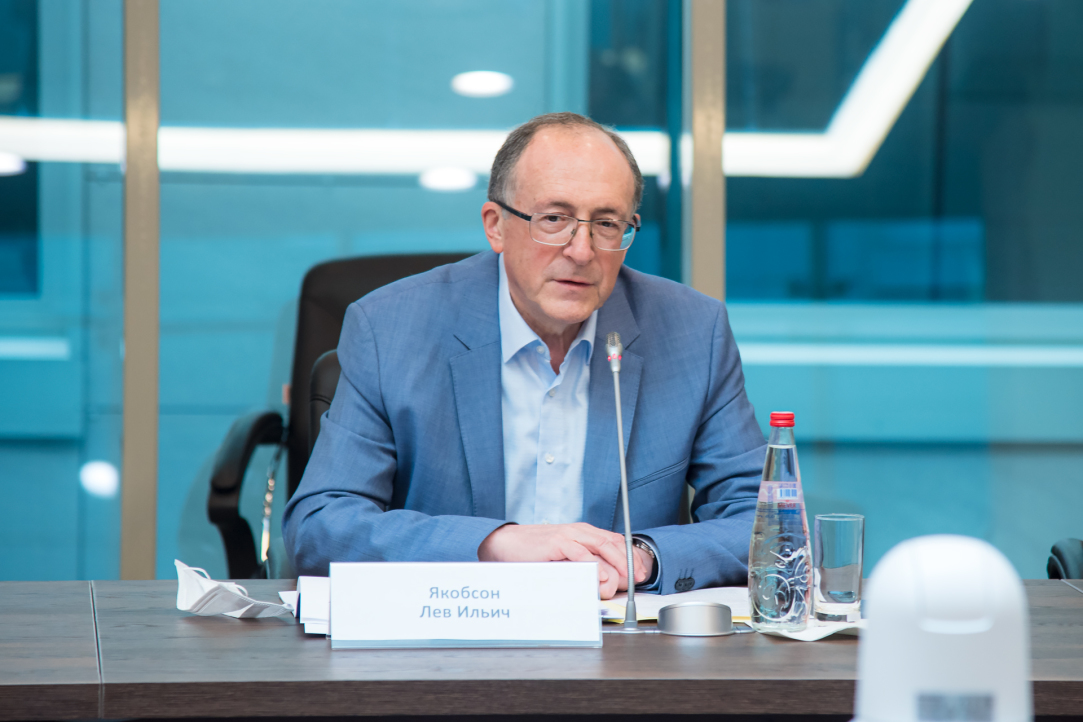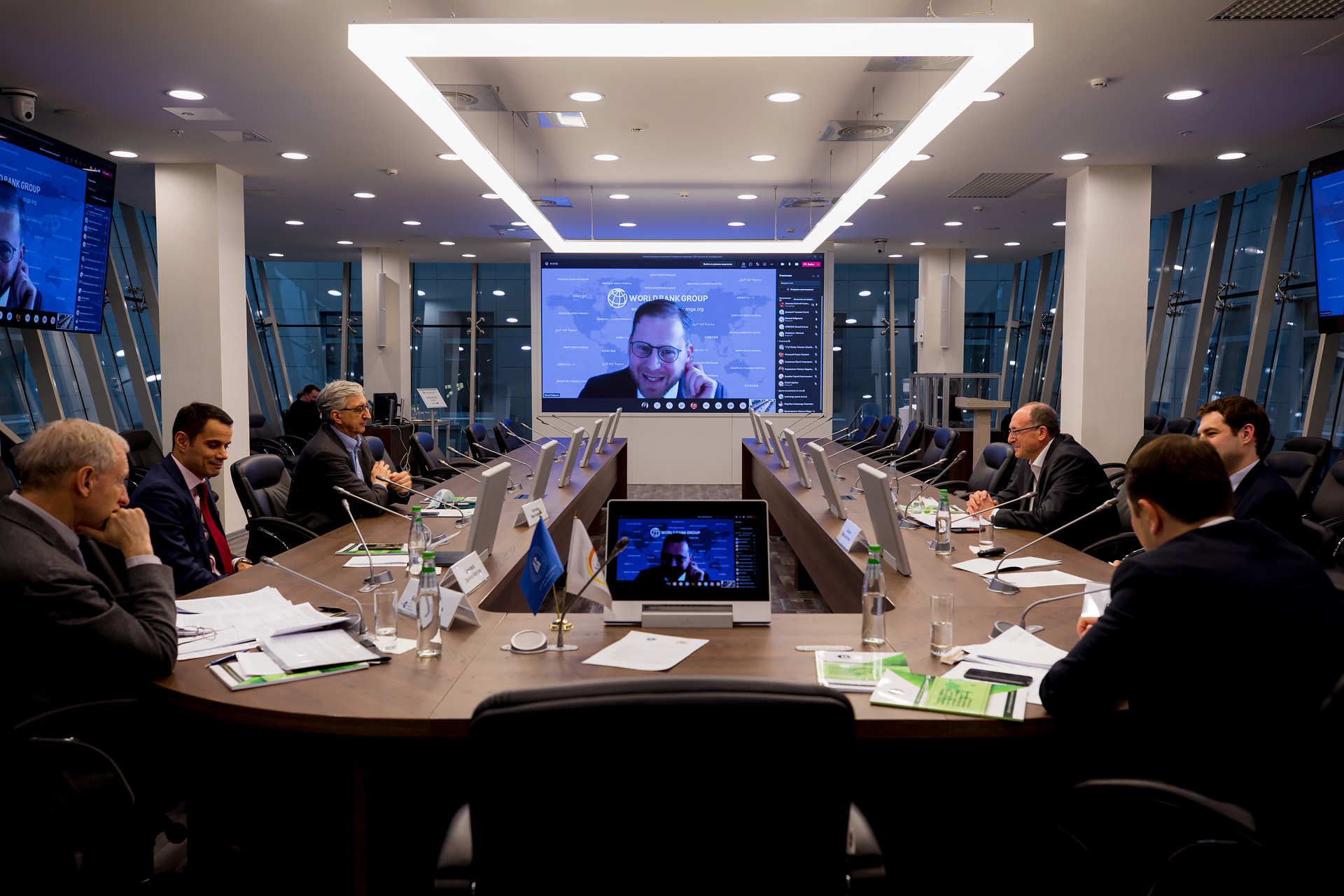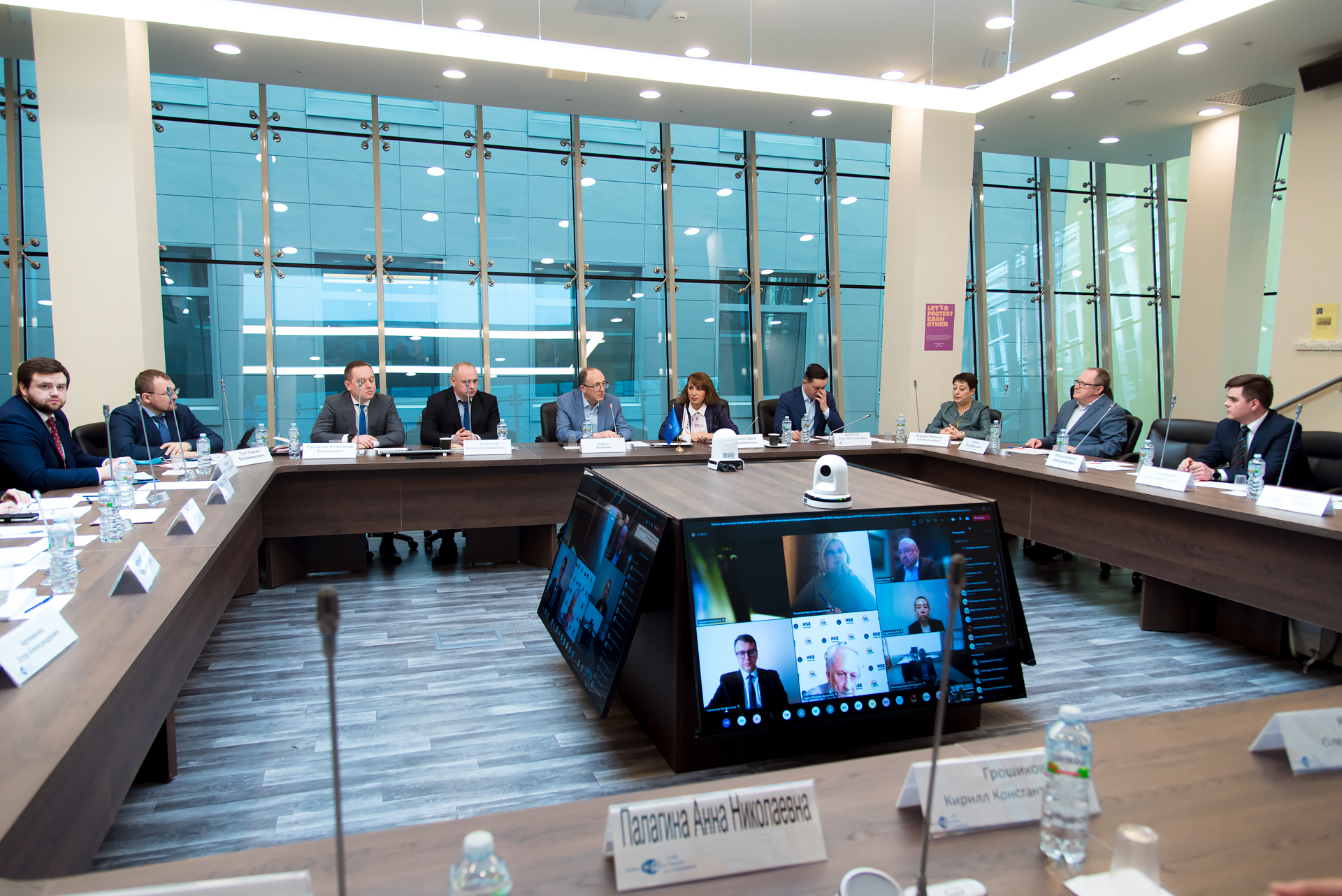The April Conference, 2021: 1,500 Participants, a Partnership with Sberbank, and an Online Format

On April 30, the XXII April International Academic Conference on Economic and Social Development came to a close. This year it was organized jointly by HSE University and Sberbank, and the majority of the events were held online. HSE Vice President and Conference Programme Committee Deputy Chair Lev Yakobson spoke with HSE News Service about his initial takeaways from the event and its new format.
Vice President Yakobson, this was HSE University’s second time holding the April Conference during the pandemic. What set this year’s conference apart from previous ones?
Our conference this year was indeed unusual. I'll start with the change that is most noticeable at first glance. Usually the conference is held on site and lasts four to five days. Last year, the conference was held entirely online and lasted a month. This year’s was held in a mixed format and lasted three weeks.
How did you come to this new format?
The previous format seemed a matter of course for major international academic conferences. We were proud, not without reason, that leading Russian and foreign scholars at the April conferences felt like they were at prestigious forums in the USA, Great Britain, or Japan. The event has gradually become perhaps the most prominent interdisciplinary social science conference among those held in post-socialist countries.
Everything would have continued in this fashion, though we had long thought that utilizing an online format would help expand the range of participants. That is, it occurred to us, but we did not dare change anything. But then the pandemic broke out. I hate to repeat the hackneyed sentiment, but, in our experience, we have become convinced that a crisis is not only a problem, but also a challenge to which, whether you like it or not, you must address.

As we all remember, the pandemic came to Russia in February-March, while applications from potential participants were collected in the fall. The applications were reviewed in the winter, and the programme was determined based on the results of the review process. Of course, all of this was done in normal conditions and in the usual format. And when the pandemic began, it seemed that it would not last long, at least in Russia. The depth of the problem became clear almost right before the start of the conference (we had announced the dates in advance). As far as I can tell from my contacts, most conferences scheduled for the spring or even summer of 2020 were canceled or postponed. I mean not only those in Russia, but, in fact, the whole world. We are one of the very few universities that decided to hold an online conference in April. It was impossible to keep the event within the usual time frame; technical restrictions did not allow it. We couldn't broadcast many sessions at the same time. Hence the monthlong period. Not all sessions took place then; some organizers and participants were scared off by the online format. But everyone who wished had the opportunity to speak and receive feedback on their research. As a result, more than half of the selected papers were presented and discussed. In the end, we found that the online format not only creates hindrances, but comes with advantages. As I said, we had thought about this before, but last year both the online format and we ourselves unexpectedly passed the ‘battle test’.
How was this year’s conference different from last year's?
As we examined the outcomes of last year’s conference, we decided to combine in-person and online formats in the future. Of course, the optimal balance had yet to be determined. By the way, this is a question that remains unanswered, since this year the ratio was dictated not by general considerations, but by the still very unfavorable epidemiological conditions. That is why the online format dominated heavily. However, unlike last year, it was not the only format.
Be that as it may, this time we did not have to arrange everything at the last minute. We were able to prepare both formats in advance. In addition, the technical capabilities of the University had significantly increased, and many of us had gained experience with participating in remote conferences held abroad. This experience, of course, came in handy.
While in 2020 we were forced to stretch the conference beyond the previously determined limits, this year we deliberately limited ourselves to a three-week period. Previously, we were guided by the fact that a typical participant is able to set aside a week to fly in, present, chat with colleagues, and travel home. This was the case at all large international conference forums. As a result, at any major conference, there are parallel sessions that are equally interesting to many participants. I know this from personal experience. Avoiding simultaneous sessions and scheduling them sequentially solves this problem in theory, but few people can afford to fly to another country or city for several weeks for the sake of a conference. Holding sessions online solves this problem. I hope that next year we will get by without the pandemic, but we will try to combine formats.
How did the new format affect the number of participants?
I won’t attempt to single out the role of the format. Various factors probably influenced the number of participants and other features of the conference. I will just name some numbers. In 2019, the face-to-face conference had 1,519 registered participants. In 2020, there were less, about 1100. This was due to the fact that not all speakers wanted to present online, which affected the audience. This year there were 1550 registered participants. And there were significantly more papers this year than in 2019: 887 versus 779.
Those are the figures regarding scholarly papers. As a rule, these papers are works in progress that will later become published articles in internationally recognized scientific journals. But there are also papers of a different genre. These are HSE reports, which set out the University's position on the current agenda, including economic, social, domestic, and foreign policy. These reports are traditionally prepared for the conference. They form the basis of discussions that are held with well-known experts, agency heads, business representatives, and public figures. 16 such reports were prepared for this year's conference. This is more than ever before.
Would you say that the mixed format was the main defining feature of this year’s conference?
I would say it was one of two defining features. An equally important feature is that we held the conference jointly with Sberbank. It is noteworthy that the part of the conference that was most covered by the press was the HSE-Sberbank Discussion Club, whose sessions were held during the second, central week of the conference. These sessions were jointly prepared by leading HSE experts and Sberbank top managers. It was not just opinions that were brought up for discussion, but well-developed expert positions and analytical materials. Along with the organizers, renowned experts from the business and governmental sectors participated. The core theme addressed by the Discussion Club was digitalization and its various dimensions: its impact on the development of economic sectors, the transformation of the social sphere, cybersecurity, and the problem of privacy in the world of social networks. The final discussion on digitalization was held by Moscow Mayor Sergey Sobyanin, Sberbank CEO Herman Gref, Russian Minister of Digital Development, Communications and Mass Media Maksut Shadayev, and HSE Rector Yaroslav Kuzminov.
You mentioned press coverage. What can you tell us about that?
This can probably be judged by the number of media publications. It was completely unprecedented: in 2019, there were about 1,500 publications about the April Conference, and the media index was 13,000 points, which is actually very good for an academic conference. However, in 2021, there were 3,000 publications about the conference, and the media index exceeded 36,000 points. This is largely thanks to the public relations team at HSE.
So everything went without a hitch?
As soon as we return from the May holidays, we will perform a detailed analysis of what happened and what needs to be corrected. We analyze this in the wake of the conference every year and, of course, we find mistakes. We identify them, naturally, in order to prevent them in the future. Immediately after the conference, usually only some emergencies or major failures that had serious consequences can be seen. Fortunately, I don’t remember anything like that this time. Of course, there were technical failures, but to be honest, I expected more of them. After all, right when the conference began, we had to switch from Zoom to MS-Teams. There were some glitches, but they were quickly eliminated, so that not a single session was disrupted. Of course, every now and then there were organizational problems, including unpleasant and complex ones. But it seems to me that none of them were really felt by the participants. Maybe the survey, which we will definitely conduct after the conference, will reveal something else. But, based on my current impression, we were able to take control of unexpected situations in time. For this, many thanks to the Organizing Committee, headed by HSE Vice Rector Ivan Prostakov, Secretary of the Organizing Committee Anna Barsukova, as well as Ekaterina Grigorieva, and all of the employees of her department for organizing and supporting events.

However, crashes are one thing, and a fundamental flaw in the online format is another. I mean the lack of communication on the sidelines. Anyone who has participated in high-quality conferences more than once will confirm that it is not only the opportunity to present a report and receive qualified, impartial assessments from colleagues that is valuable. No less useful are the informal discussions, coffee break conversations, and making new contacts with those who work on similar topics in other countries and regions.
This a vulnerability of the online format that seems to be irreparable. Sometimes conferences held abroad offer a kind of virtual lobby. I may not be familiar enough with this, but I am not yet enthusiastic about it. Be that as it may, in terms of backstage communication, the last conference does not compete very well with those held before the pandemic. We will think about how to at least partially compensate for this shortcoming.
How important do you think the scholarly examinations of the pandemic were at the conference?
Of course, a lot has been said about the pandemic. Relatively more at expert round tables and less in academic reports. The reasons are obvious. Expert analytics, including high quality ones, are usually prepared faster than fundamental research is done. In addition, the scholarly reports were prepared on the basis of applications that were submitted in the fall. In this case, the application does not just involve expressing your desire to present. It must include a compelling summary of the research performed. By the fall, the pandemic had already taken a huge place in the research agenda of not only physicians, but also representatives of many fields in the social sciences. However, few studies had been completed. I try to follow the literature and see that they are increasing in volume. I hope that this fall we will receive many interesting applications for the next conference. It is almost certain that they will broadly cover different aspects of the pandemic.
Are the forecasts and proposals put forward by experts at the conference studied by decision-makers in the upper levels of the government and in large companies?
Of course, they are studied and taken into account. HSE University is an institution under the Russian government, and these are not just words on a signboard. Our leading experts are in constant working contact with officials and employees of government ministries, the Government Office, and the Presidential Administration. This spring, experts are deeply involved in the preparation of a new strategy for the Government. This work, of course, was reflected in the presentations at the conference, but in practical terms, working communication is, of course, more important than round tables.
You can read more about the XXII April International Academic Conference organized by the HSE and Sberbank here.
See also:
25th Yasin (April) International Academic Conference Now Accepting Proposals
Reports on new research results will be presented and discussed as part of the conference’s sections. These reports will be selected based on reviews of proposals. As always, the conference programme features expert discussions of the most pressing economic, social, internal and external issues in the format of roundtables and associated events.
Academic Council: HSE University’s Contribution to Achieving National Goals and Development Priorities to Increase
HSE University’s Development Programme until 2030 will be improved in order to increase the university’s contribution to achieving national goals and implementing the priorities of the country’s scientific and technological development. This decision was made by the university’s Academic Council on April 26. The meeting also addressed the principles for the development of HSE University’s external communications, one of which is the creation of a high-quality information field around the university.
Keeping Up with the Neighbours: Envy as a Driver of Economic Growth
Classical economic theory assumes that economic agents are entirely self-interested and rational in their pursuit of material well-being, and that they are not affected by external factors. As a result, externalities are not considered in any way when constructing economic models. Nevertheless, some sociologists argue for a revision of modern economic theory to incorporate the ethical dimensions of economic agents' behaviour. Kirill Borissov, Professor of the Faculty of Economics at the European University in St Petersburg, spoke at the XXIV Yasin (April) International Academic Conference and shared his observations from creating his own economic model incorporating the factor of envy.
Structural Transformation and Drivers of Sustainable Growth in Russian Economy Discussed at HSE University
The Russian economy has demonstrated high resilience to unprecedented external pressure and has managed to largely adapt to new conditions. As early as this year, it can go from recession to growth. The issue of where to find drivers and resources for this was discussed at a plenary session titled ‘Russian Economy under Sanctions: From Adaptation to Sustainable Growth’ at the XXIV Yasin (April) International Academic Conference held at HSE University as part of the Decade of Science and Technology. Minister of Economic Development of the Russian Federation Maksim Reshetnikov took part in the discussion.
‘People Want to Receive Only Useful Content’
Experts say that interest in news has sharply increased among the Russian audience. At the same time, part of the audience deliberately avoids it. What kind of content is in demand and will people continue to watch TV? These and other issues were discussed at the plenary session ‘ Info-hygiene and Information Elitism: How to Consume Media Properly’ at the XXIV Yasin (April) International Academic Conference.
'The Emerging Trends in Africa Will Shape the World Order, and We Need to Be Prepared for That'
Africa has the potential to become a new economic giant. Today, African countries are interested in comprehensive cooperation and strengthening their positions in the global arena, and they look forward to receiving assistance from Russia and China in developing their technology, economy, and social sphere. Effective engagement with Africa requires training a greater number of professional African studies specialists. The XXIV Yasin (April) International Academic Conference at HSE University featured a plenary session on 'Africa in a Changing World'.
Learning a Foreign Language Can Delay the Onset of Dementia
Dementia, a debilitating form of cognitive impairment, can be preventable. According to Professor Jubin Abutalebi of the University Vita Salute San Raffaele, Italy, and the Arctic University of Tromsoe, Norway, the easiest way to prevent cognitive decline after the age of 60 is to learn and practice foreign languages – the more languages, the better, suggests Professor Abutalebi in his presentation 'Preventing dementia through bilingualism' at the XXIV Yasin (April) International Academic Conference.
‘The BRICS Strategic Partnership Offers the World Creative, Unifying, Forward-Looking Initiatives’
Today, BRICS has become an influential factor in modern international relations and is perceived as one of the pillars of a more just world order. This association is not based on one party’s dominance, but instead, is built on a sound balance of interests. The role of the association was discussed by the participants of the plenary session ‘BRICS Development Strategy: Equal Opportunities in an Unequal World’at the XXIV Yasin (April) International Academic Conference.
Sanctions Create New Opportunities for Russian Companies
Like any crisis, the sanctions of 2022, besides problems, have created new opportunities for Russian companies. This is the conclusion that HSE University’s experts have come to. Their study results are presented in the report ‘Adaptation of Russian Industrial Companies to Sanctions: First Steps and Expectations’, prepared by HSE University for the XXIV Yasin (April) International Academic Conference.
Search Query: How to Study Migration with Google Trends
Experts have calculated that the number of international students in Russia has grown six times over the last decade, and researchers say that many of those who are studying today would like to stay in the country. This, alongside issues such as why Google Trends are worth looking into, were covered at the HSE XXIV Yasin International Academic Conference on Economic and Social Development section on demography and labour markets.


